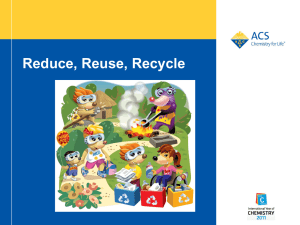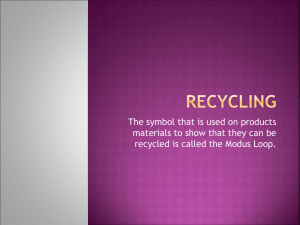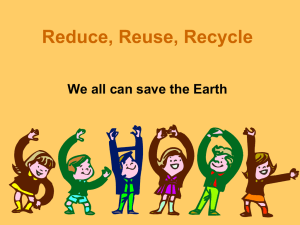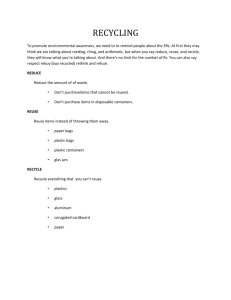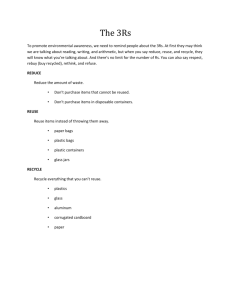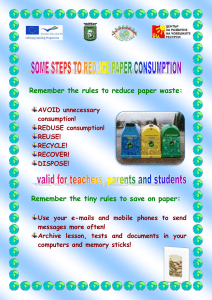WORD - ABC
advertisement
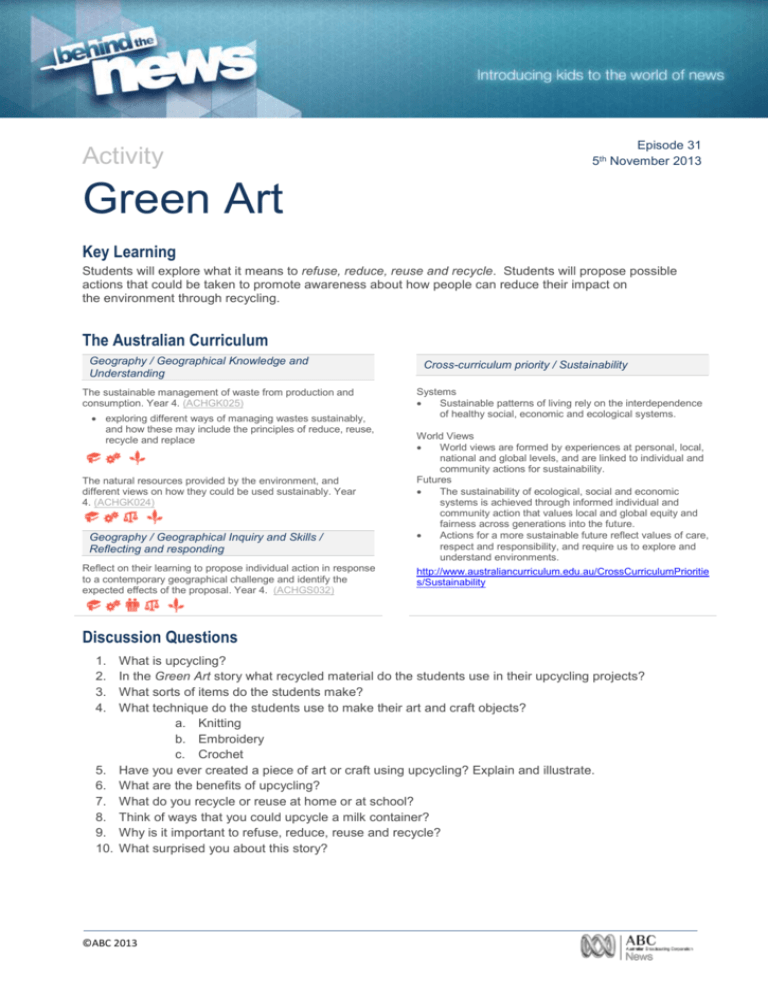
Activity Episode 31 5th November 2013 Green Art Key Learning Students will explore what it means to refuse, reduce, reuse and recycle. Students will propose possible actions that could be taken to promote awareness about how people can reduce their impact on the environment through recycling. The Australian Curriculum Geography / Geographical Knowledge and Understanding The sustainable management of waste from production and consumption. Year 4. (ACHGK025) exploring different ways of managing wastes sustainably, and how these may include the principles of reduce, reuse, recycle and replace The natural resources provided by the environment, and different views on how they could be used sustainably. Year 4. (ACHGK024) Geography / Geographical Inquiry and Skills / Reflecting and responding Reflect on their learning to propose individual action in response to a contemporary geographical challenge and identify the expected effects of the proposal. Year 4. (ACHGS032) Cross-curriculum priority / Sustainability Systems Sustainable patterns of living rely on the interdependence of healthy social, economic and ecological systems. World Views World views are formed by experiences at personal, local, national and global levels, and are linked to individual and community actions for sustainability. Futures The sustainability of ecological, social and economic systems is achieved through informed individual and community action that values local and global equity and fairness across generations into the future. Actions for a more sustainable future reflect values of care, respect and responsibility, and require us to explore and understand environments. http://www.australiancurriculum.edu.au/CrossCurriculumPrioritie s/Sustainability Discussion Questions 1. 2. 3. 4. 5. 6. 7. 8. 9. 10. What is upcycling? In the Green Art story what recycled material do the students use in their upcycling projects? What sorts of items do the students make? What technique do the students use to make their art and craft objects? a. Knitting b. Embroidery c. Crochet Have you ever created a piece of art or craft using upcycling? Explain and illustrate. What are the benefits of upcycling? What do you recycle or reuse at home or at school? Think of ways that you could upcycle a milk container? Why is it important to refuse, reduce, reuse and recycle? What surprised you about this story? ©ABC 2013 Activities Engage As a class discuss what is meant by the phrase ‘refuse, reduce, reuse and recycle’. Define each of the words and what they mean to you. Continue the class discussion using the following inquiry questions: Where does your rubbish go? What is landfill? What is the best way to reduce landfill? What do you recycle or reuse at home and at school? Why is it important to refuse, reduce, reuse and recycle? What is upcycling? Should upcycling be added to the ‘refuse, reduce, reuse and recycle’ phrase? Explain. School recycling project The following project gives students a simple framework within which to plan and deliver and recycling project in their school. Students will propose possible actions that could be taken to promote awareness about how people can reduce their impact on the environment. Decide whether the project will target your own class, a year group or the whole school. Through this project students will develop their communication and teamwork skills within their school community. Students will: Audit their schools waste Identify where improvements can be made Set targets, plan and take real steps to improve recycling facilities Plan and execute a campaign to educate and encourage students to recycle whenever they can Measure their success and report back to the school Sustain their recycling effort in the longer term. Refer to the Wipe out Waste program for ideas on how to approach waste management and learning at your school. http://www.wow.sa.gov.au/ Recycling design project Students will investigate, design/plan, create and exhibit their own upcycling project. As a class ask students to think about products that could be made using recycled materials. Record student’s responses on the classroom whiteboard. For ideas refer to: Planet Arks tips on 25 things you can reuse at home. http://www.recyclingnearyou.com.au/education/25things-to-re-use.cfm ©ABC 2013 Engineering a better world:100 Amazing upcycling ideas anyone can do http://toponlineengineeringdegree.com/?page_id=116 A web search of products made from recycled materials may also help inspire students. There are also retail outlets that sell products made from recycled materials, for example Oxfam. Mini Activity How could you reuse the following objects? o Paper o Milk carton o Plastic straw o Cardboard box o Chip packet Students will decide on an object to make and sketch it. Students need to ensure that they have access to the materials, equipment and skills required to construct their object. What recycled materials are needed? Does the design need to be adapted? Students collect recycled materials (from home or school) and equipment needed to construct/manufacture their product. A list of items students might require include: cardboard, toilet rolls, paper, tins, bottles, bottle tops old CDs, old clothes/fabric, magazines etc. Display your students work as an art exhibition to be displayed in the classroom or art area which can be accessed by the rest of the school. Each student/group can give a brief description of their object. If students have designed clothing consider holding a fashion show at your next school assembly. Students will record any problems they had in the construction of their project. What steps did you take to overcome the problems? What worked well with the design? What would you do differently next time? ©ABC 2013 Visit the Traid website for lots of ideas on how to upcycle recycled materials, including this activity on turning an old t-shirt into a bag! http://www.traid.org.uk/ ©ABC 2013 Related Research Links Evelyn Roth Festival Arts – Recycled Videotape http://evelynrothoz.com/photos-9/ Sweet P – Upcycling VHS Tapes http://sweetphk.com/2013/07/19/upcycling-vhs-tapes/ Behind the News – Recycling http://www.abc.net.au/btn/story/s2321538.htm Planet Ark – 25 Things you can reuse at home http://www.recyclingnearyou.com.au/education/25-things-to-re-use.cfm ©ABC 2013
